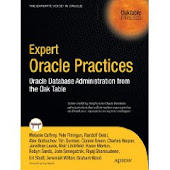In general it is known that Function-Based Indexes (FBIs) can no longer be used by the optimizer if the expression contains literals and CURSOR_SHARING = FORCE / SIMILAR (deprecated) turns those literals into bind variables. Jonathan Lewis described the issue quite a while ago
here in detail.
In a recent
OTN thread this issue was raised again, but to my surprise when I played around with a test case that mimicked the OP's problem query I found that (certain) Oracle versions have some built-in logic that enable FBI usage for certain cases where you would expect them to be not usable.
If you test the following code on versions from 10.2.0.4 (possibly earlier) up to and including version
11.2.0.3 then you'll notice some interesting details:
create table t
as
select * from all_objects;
create index t_idx on t (owner || ' ' || object_name);
exec dbms_stats.gather_table_stats(null, 't')
set echo on linesize 200 pagesize 0
alter session set cursor_sharing = force;
select /*+ full(t) */ * from t where owner || ' ' || object_name = 'BLA';
select * from table(dbms_xplan.display_cursor);
select /*+ index(t) */ * from t where owner || ' ' || object_name = 'BLA';
select * from table(dbms_xplan.display_cursor);
select /*+ index(t) */ * from t where owner || 'A' || object_name = 'BLA';
select * from table(dbms_xplan.display_cursor);
Here is the relevant output I got from 11.2.0.1 for example:
SQL> alter session set cursor_sharing = force;
Session altered.
SQL>
SQL> select /*+ full(t) */ * from t where owner || ' ' || object_name = 'BLA';
no rows selected
SQL>
SQL> select * from table(dbms_xplan.display_cursor);
SQL_ID ar3tw7r1rvawk, child number 0
-------------------------------------
select /*+ full(t) */ * from t where owner || :"SYS_B_0" || object_name
= :"SYS_B_1"
Plan hash value: 1601196873
--------------------------------------------------------------------------
| Id | Operation | Name | Rows | Bytes | Cost (%CPU)| Time |
--------------------------------------------------------------------------
| 0 | SELECT STATEMENT | | | | 284 (100)| |
|* 1 | TABLE ACCESS FULL| T | 1 | 117 | 284 (2)| 00:00:04 |
--------------------------------------------------------------------------
Predicate Information (identified by operation id):
---------------------------------------------------
1 - filter("OWNER"||' '||"OBJECT_NAME"=:SYS_B_1)
19 rows selected.
SQL>
SQL> select /*+ index(t) */ * from t where owner || ' ' || object_name = 'BLA';
no rows selected
SQL>
SQL> select * from table(dbms_xplan.display_cursor);
SQL_ID 6kzz3vw5x8x3b, child number 0
-------------------------------------
select /*+ index(t) */ * from t where owner || :"SYS_B_0" ||
object_name = :"SYS_B_1"
Plan hash value: 470836197
-------------------------------------------------------------------------------------
| Id | Operation | Name | Rows | Bytes | Cost (%CPU)| Time |
-------------------------------------------------------------------------------------
| 0 | SELECT STATEMENT | | | | 4 (100)| |
| 1 | TABLE ACCESS BY INDEX ROWID| T | 1 | 117 | 4 (0)| 00:00:01 |
|* 2 | INDEX RANGE SCAN | T_IDX | 1 | | 3 (0)| 00:00:01 |
-------------------------------------------------------------------------------------
Predicate Information (identified by operation id):
---------------------------------------------------
2 - access("T"."SYS_NC00016$"=:SYS_B_1)
20 rows selected.
SQL>
SQL> select /*+ index(t) */ * from t where owner || 'A' || object_name = 'BLA';
no rows selected
SQL>
SQL> select * from table(dbms_xplan.display_cursor);
SQL_ID 6kzz3vw5x8x3b, child number 1
-------------------------------------
select /*+ index(t) */ * from t where owner || :"SYS_B_0" ||
object_name = :"SYS_B_1"
Plan hash value: 3778778741
-------------------------------------------------------------------------------------
| Id | Operation | Name | Rows | Bytes | Cost (%CPU)| Time |
-------------------------------------------------------------------------------------
| 0 | SELECT STATEMENT | | | | 52472 (100)| |
|* 1 | TABLE ACCESS BY INDEX ROWID| T | 724 | 84708 | 52472 (1)| 00:10:30 |
| 2 | INDEX FULL SCAN | T_IDX | 72351 | | 420 (1)| 00:00:06 |
-------------------------------------------------------------------------------------
Predicate Information (identified by operation id):
---------------------------------------------------
1 - filter("OWNER"||:SYS_B_0||"OBJECT_NAME"=:SYS_B_1)
20 rows selected.
Looking at the statement text that results from "CURSOR_SHARING = force" we can spot the expected
bind variables instead of the literals, and this should result in a corresponding
predicate that doesn't match the FBI expression. However, when looking at the
filter expression in the predicate section (when forcing a full table scan) we can spot something interesting: It still shows the literal, which doesn't correspond to the predicate of the rewritten query text.
The next execution shows that the FBI really can be used despite the bind variable replacement taking place, and the final execution shows that the cursor sharing works correctly in that sense that a
new child cursor got created for the same SQL text with a different plan and different predicate section when using a
different literal in the original SQL text. V$SQL_SHARED_CURSOR shows "HASH_MATCH_FAILED" which is described as "No existing child cursors have the unsafe literal bind hash values required by the current cursor", which makes sense and probably means that the corresponding bind variable is marked as
"unsafe" internally.
This optimisation shows only up if there is a suitable FBI - if there's no corresponding expression the SQL text and predicate section match. Furthermore it only supports certain expressions - Jonathan's example shows that in general it's true that these rewrites prevent FBI usage. And obviously it ceases to work in 11.2.0.4 and 12c. Whether this is a bug or a feature I don't know, but since it only seems to apply to certain expressions it's probably not that relevant anyway.
As Jonathan points out in his note you can always work around the general problem by hiding the expression in a view, and since 11g of course a proper
virtual column definition is the better approach, which doesn't expose this problem either.
Even better would be the proper usage of bind variables and not using forced cursor sharing, but there are still many installations out there that rely on that feature.


No comments:
Post a Comment
Note: Only a member of this blog may post a comment.